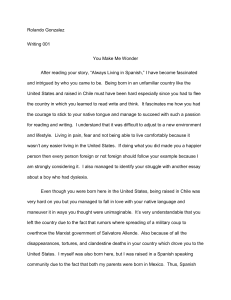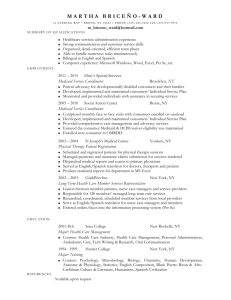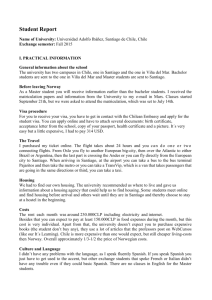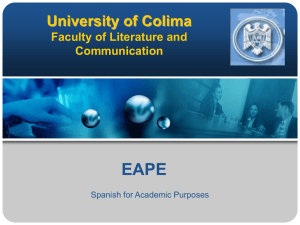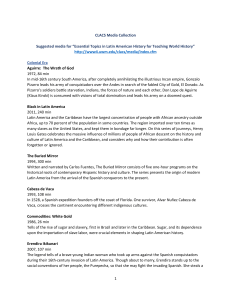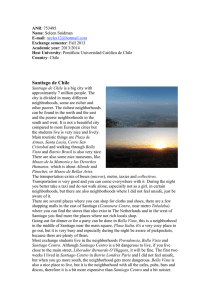Chile, a Mars on Earth By LEE Wai Lam Jonathan
advertisement
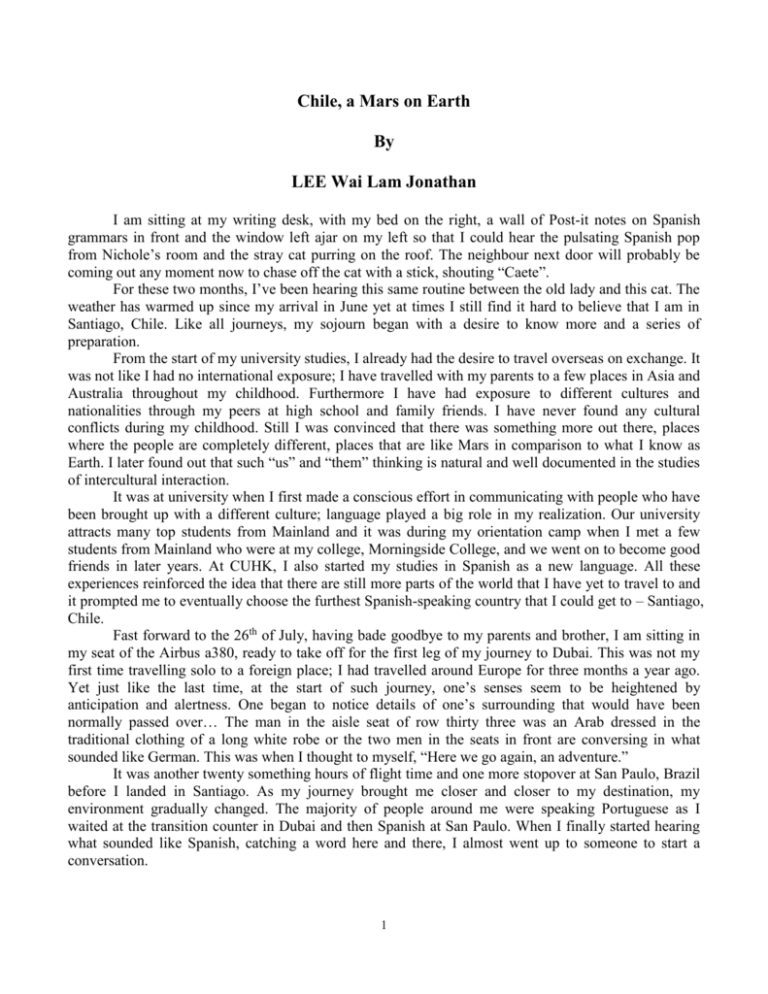
Chile, a Mars on Earth By LEE Wai Lam Jonathan I am sitting at my writing desk, with my bed on the right, a wall of Post-it notes on Spanish grammars in front and the window left ajar on my left so that I could hear the pulsating Spanish pop from Nichole’s room and the stray cat purring on the roof. The neighbour next door will probably be coming out any moment now to chase off the cat with a stick, shouting “Caete”. For these two months, I’ve been hearing this same routine between the old lady and this cat. The weather has warmed up since my arrival in June yet at times I still find it hard to believe that I am in Santiago, Chile. Like all journeys, my sojourn began with a desire to know more and a series of preparation. From the start of my university studies, I already had the desire to travel overseas on exchange. It was not like I had no international exposure; I have travelled with my parents to a few places in Asia and Australia throughout my childhood. Furthermore I have had exposure to different cultures and nationalities through my peers at high school and family friends. I have never found any cultural conflicts during my childhood. Still I was convinced that there was something more out there, places where the people are completely different, places that are like Mars in comparison to what I know as Earth. I later found out that such “us” and “them” thinking is natural and well documented in the studies of intercultural interaction. It was at university when I first made a conscious effort in communicating with people who have been brought up with a different culture; language played a big role in my realization. Our university attracts many top students from Mainland and it was during my orientation camp when I met a few students from Mainland who were at my college, Morningside College, and we went on to become good friends in later years. At CUHK, I also started my studies in Spanish as a new language. All these experiences reinforced the idea that there are still more parts of the world that I have yet to travel to and it prompted me to eventually choose the furthest Spanish-speaking country that I could get to – Santiago, Chile. Fast forward to the 26th of July, having bade goodbye to my parents and brother, I am sitting in my seat of the Airbus a380, ready to take off for the first leg of my journey to Dubai. This was not my first time travelling solo to a foreign place; I had travelled around Europe for three months a year ago. Yet just like the last time, at the start of such journey, one’s senses seem to be heightened by anticipation and alertness. One began to notice details of one’s surrounding that would have been normally passed over… The man in the aisle seat of row thirty three was an Arab dressed in the traditional clothing of a long white robe or the two men in the seats in front are conversing in what sounded like German. This was when I thought to myself, “Here we go again, an adventure.” It was another twenty something hours of flight time and one more stopover at San Paulo, Brazil before I landed in Santiago. As my journey brought me closer and closer to my destination, my environment gradually changed. The majority of people around me were speaking Portuguese as I waited at the transition counter in Dubai and then Spanish at San Paulo. When I finally started hearing what sounded like Spanish, catching a word here and there, I almost went up to someone to start a conversation. 1 Bus ride to the hostel It was already ten thirty at night. I had a clear plan of what I needed to do before getting to the hostel, where I had reserved a place for one week to get myself settled in the new environment. I followed through with my plan, first exchanging Hong Kong dollars to Chilean pesos. Then, I exited the arrival hall and found the exit for the bus terminal that would get me to my hostel. Along the way I had to ask a few people for directions but I was well prepared with simple questions that only required yes or no answers. Everything went as planned and without surprises and I was on the right bus to the city centre by eleven. It was very important to me that I was executing everything according to my planned schedule. In the beginning, I viewed Chile to be more or less the same as the rest of South America and it was hard to shake off one’s preoccupation with safety. In my limited pre-trip research on the internet, it seemed that, more often than not, travellers experienced unpleasant encounters here. I knew that most of my fears were all in my head due to resistance towards the unfamiliar, and that, at some point, I will adapt to my surroundings. These thoughts ran through my mind as I stood in the micro, a public bus that is a little bigger than Hong Kong’s minibus. I had one hand rested on my suitcase and the other holding onto the rail as the bus passed through the streets. There were few people on the streets and most were in groups. I noticed that the man in a windbreaker was standing a little close to me, perhaps I should watch myself I thought; the hand that had been resting on the suitcase unconsciously went to pat my pocket where I had put my wallet. Suddenly I felt someone’s hand on my bag behind me, I turned around, and the owner of the hand was an old man sitting with an old lady beside him, holding onto his other forearm. “Sorry, your bag…” He said in Spanish. “Oh I’m sorry.” I stuttered, tongue-tied as I struggled to express myself in Spanish due to the suddenness of the situation. I later arrived at my hostel in one piece. Communicating in Spanish With almost three years of Spanish studies in the bag, one would think that I would not have a hard time communicating in the language; I could not have been more wrong. Like many other languages, Spanish is localized in Chile to form Chileno and it is infamous for its huge list of colloquial words and phrases, and is spoken at an impossible speed. I understood nothing for the first week despite being familiar with the majority of the words in the conversations. Living with a second language is a game of patience and perseverance. It is about waking up every morning to take advantage of all the available opportunities to absorb the new language. I later realized in a conversation that this problem even extends to native-Spanish speakers. “It frustrates me that the other students do not understand me. I speak very clearly, with every word pronounced the way that it should be.” Carolina said. It was week five and I had made good friends in my classes. Carolina was an exchange student from Columbia and Raul a local student; we had just walked out after the end of our philosophy class. “Really? But you speak Spanish.” I said. “Yeah. I was in my Economics class and we had a group discussion test and none of my groupmates understood me. I had to repeat myself several times. Still I don’t think they understood me at the end.” She added. “What is the difference between Columbian Spanish and Chileno?” I asked Raul. 2 “Well it’s that Columbians don’t pronounce some of the sounds. But I mean Chileans speak very fast as well and differently, for example, I normally speak much faster than right now.” Raul explained, putting emphasis on each word in the last sentence. Communicating with people from another culture is not only about speaking the language; it extends to the way one speaks and the convergence to the others’ speaking style. It is about meeting each other in the middle. Sometimes these steps towards the middle also mean stepping out of one’s shoes. I do not dance and have never had any great interest in it, but through my Salsa class I have learned how to dance and grasped the element of fun in dancing that is essential for many in Chile. “Your steps are too big. It’s very hard to dance to the beat with such big steps. Smaller steps. Smaller. Yes, that’s it.” The dance instructor said to me in the first lesson. I was trying to focus on many things at the same time. The music layered with the piano, congas and other instruments. The one-twothree beat counting aloud in my mind. My feet caught up with the irregular clave rhythm. Trying not to step on Valentina’s feet too often. And wait, I think I just understood what my dance instructor had said without translating it in my head… Reflection It is hard to describe my growth in these few months. Certainly I have learned a few more words and concepts about intercultural communication, but knowledge is only the first step of the long process. Yet I am confident that I have grown at least a little in this short period. I am now more conscious of how I communicate with another and I also noticed that I am facing more dilemmas during my communication with people from a different culture. Dilemmas that required my conscious effort in resolving it, like should I converge to the Chilean way of greeting or diverge to emphasize my cultural identity. I believe that by working through all these dilemmas, with time, I will become a much more effective communicator and a global citizen of the modern world. This semester, the online UGED (CUHK) course that I have taken, Intercultural Communication and Engagement Abroad, has given me the opportunity, motivation and words to review, relive and reflect detail of my experience in these three months. It has allowed me to realize detail that I would have just passed over in excitement for even more. It has given me the pause to see myself from another point of view and often, it is at these moments that I realigned myself to my sojourn goals and redefined my direction for this once in a lifetime experience. 3 Me and my Chilean family at the parade for Chile’s Independence day About the author LEE Wai Lam Jonathan is a 5th-year student in the Professional Accountancy program, who has a minor in Spanish. In the 2015-16 academic year he is participating in a year-long exchange program at the Pontifical Catholic University of Chile in Santiago. 4




